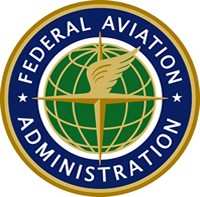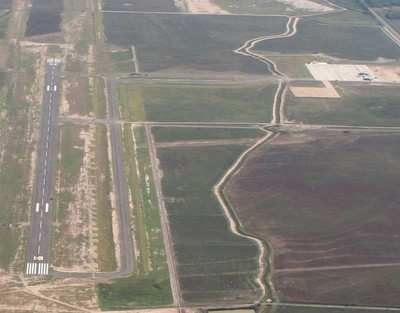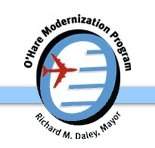You know, the FAA and the airport community have always been
open with one another. Chip, Greg — I’m sure you'll
both agree. We're often on the same page; sometimes we see things
differently. But hey, that's the sign of a healthy partnership.
Even though we don't always see eye-to-eye, I know we can
honestly say that we've never let our disagreements devolve into
something that undercuts the national aviation system that we all
seek to protect and advance.
In light of that, I want to talk with you about a growing
concern I have. I want to stress that this is not directed at AAAE
or ACI, but I raise it because I believe it's a concern we all
share.
 In recent weeks, the rhetoric
about our finance reform bill has become very, shall I say,
animated and aggressive?
In recent weeks, the rhetoric
about our finance reform bill has become very, shall I say,
animated and aggressive?
And while I wish I could say that the debate has been squarely
on policy grounds alone, the truth is the focus seems to have
turned from the merits of our bill to questioning the gains we've
made at the FAA, including saving taxpayers millions, improving
safety, and operating like a business.
The hope, I guess, is if the debate is diffused from the core
issue of NextGen to very old issues that seek to cast a doubt on
FAA competencies, financing reform won't seem worth it.
We can go back to limping along with the old way of doing
business.
I've testified before no less than four hearings in the last few
weeks about our bill. We've got three more this week, including one
tomorrow where Kirk Shaffer, the new head of our Airports program,
will be testifying along with Chip and Greg.
As recently as two weeks ago when I testified, I found the
atmosphere on the Hill was collegial. But lately, I've been seeing
a change.
For me, aviation has never been about partisan politics. It's
been pretty even-handed across the aisle. It's always been about
safety and efficiency and accountability. That's why we've been the
world leader in aviation.
So it's mighty frustrating when you've got people out there
saying our bill didn't get it right, but no one is saying what
“right” looks like.
The most important thing right now is not to let narrow,
individual interests trump real policy discussions.
Look, I know our legislation's not perfect. I never said it was.
We counted on there being opposition, because let's face it —
change of this magnitude is never easy. But everyone who has taken
a serious look at this from NCARC to the Aerospace Commission has
recommended similar reforms. So let's sit down and build a proposal
that'll fly for everyone.
Tell you what. If the FAA really wanted to kill GA, as our
critics claim, we'd just sit back and do nothing. We'd leave the
air traffic system just the way it is, and let congestion slowly
squeeze them out.
And if we really wanted to undermine our controllers, as some
allege, we wouldn't be paying them $50,000 after a year on the job
or $94,000 after five years. That's pretty good money by anyone's
standard. Veteran controllers, mind you, have been held virtually
financially unharmed.
Another charge I've been hearing that I want to rebut —
this notion that our proposal eliminates congressional oversight of
the FAA. Not true. Our bill does nothing of the sort.
 In fact, a fee-based system is much
more transparent and accountable, and therefore easier to
review.
In fact, a fee-based system is much
more transparent and accountable, and therefore easier to
review.
And finally, there's the matter of the $600 million less that
our critics claim is raised under our financing system versus the
current one. No.
Ours is a cost-based system, meaning we raise exactly what we
need. The AIP figure in the President's budget was 2.75.
If Congress funds AIP at more recent historical levels, it'll
raise that amount, about $600 million more, and actually, more than
the current fixed-tax system.
Look, why am I telling you all this? It's not because AAAE and
ACI are the culprits in this debate. It's because I worry that the
debate is not focusing on the need and opportunity before us.
In a real sense, the needs of the FAA and the airports are
similar. We both require stable, reliable, predictable revenue
streams. Airports are a powerful force of reason in the funding
reform debate, and I hope you will use it to get to an end state
where we all need to be.
Now that you've got a sense of what's on my mind, I'd like to
discuss with you some of your questions about the bill and to touch
on a few more myths that have been making the rounds.
Here's one: “Your proposal for tiered GA airport
entitlements means that over 700 airports will no longer be assured
of annual AIP money. How does this ensure that small airports
continue to receive the AIP funding they need?”
Good question. And the answer is the current entitlement program
just doesn't work. Every airport is guaranteed — guaranteed
— up to $150,000 a year, regardless of size or need.
For many of the busiest and most complex GA facilities, this
level isn't enough. But for smaller airports with less activity, it
may be too much. It depends on a variety of factors.
One thing's for certain — all of these airports will
remain eligible for AIP, but the lowest activity facilities won't
be guaranteed an annual entitlement.
Rather, the funding guarantees will be focused on the busier GA
facilities that'll play a critical reliever role as we transition
to NextGen.
Our proposal fixes a major shortcoming — treating all
small airports the same, regardless of need. It didn't work for us,
and I know it didn't work for you.
We're also protecting passenger entitlements. That way, we
eliminate the risk that the money will be halved, or even done away
with completely if AIP falls below $3.2 billion.
OK, someone else asks: “Why are you looking to decrease
the federal share to 90 percent from 95, knowing it'll increase the
financial burden on small airports? Especially at a time when we're
most dependent on AIP dollars to finance capital needs?”
Well, the short answer is, Congress intended the 95 percent to
be a temporary measure in response to 9/11. We're looking to let
that increase expire on Congress's original schedule.
Our bill will actually free up more than $100 million a year
that'll now be available to fund additional projects at small
airports.

Next query. This one on PFCs.
“PFCs were meant to help airports meet critical safety and
capacity needs, such as new runways. Some of us are frankly worried
that too much PFC money is already being spent on the terminal and
other facilities. Why is it a good idea to expand PFC eligibility
to garages when they already pay for themselves, and even make a
profit?”
First off, let me say a word or two about new runways. As you
know, we've been very busy on that front.
We've added 13 of them since 1999, four in the past year alone:
Hartsfield, Logan, Lambert, and Cincinnati.
New runways and extensions are coming to six more airports by
2010, including projects at Philadelphia International and Chicago
O'Hare.
 All of this capacity couldn't have
come at a better time. If you were at our Forecast Conference a
couple of weeks ago, you heard me say that we've already got 18 of
our biggest airports at pre-9/11 highs.
All of this capacity couldn't have
come at a better time. If you were at our Forecast Conference a
couple of weeks ago, you heard me say that we've already got 18 of
our biggest airports at pre-9/11 highs.
We're projecting that we'll add four more to the list:
Baltimore, Detroit, Newark and Phoenix in just the next couple of
years.
Improvement plans must continue to move forward to avoid a
repeat of 2006. That was a record year for delays, with more than
490,000 flights that weren't on time.
Fact is, 2007 isn't looking any better. In just the first two
months of this year, we've had 63,000 delays. At this rate, '07
will be the worst ever. That is, until 2008 comes along.
But if we continue to make the right investments — and we
are — all of aviation will benefit.
And that brings me to why our proposal is so important. It
addresses concerns raised by smaller airports. As many of you know,
they're under a lot of pressure to keep landing fees and terminal
rents low to keep businesses and attract new ones.
They say that additional PFC flexibility could help them do just
that. Their argument is if PFCs were available to pay for things
like garages, more revenue would flow to the bottom line to help
offset their operating costs.
The big picture reason here is that our bill streamlines a
process that has gotten so unwieldy and bureaucratic, and generates
way too much paperwork.
No matter how you slice it, our bill allows airports to meet
their capital needs. We're boosting the maximum PFC, and you'll
have greater flexibility in managing your finances. Plus, we target
AIP funds to advance NextGen from the drawing board to reality.
We didn't just pull these out of a hat. These are all things
that you asked us for. While we may disagree on a few this and
thats, we can all agree that the FAA needs a stable and predictable
funding stream, one that's cost-based and allows us to get NextGen
in place.
If Congress fails to act on our bill by September, airports will
immediately feel the pinch. That new runway you're hoping for may
start late in the construction season or be lost for the entire
year.
The price tags are likely to go up, as will the harm to you. We
predict that every month that goes by without raising the PFC costs
airports $100 million.
Perhaps worst of all, foot-dragging on our bill will rob you of
your ability to plan ahead. I know how important that is to
airports, big and small alike.
Congressional action this fiscal year is critical to advancing
our NextGen initiatives. If funding reform isn't approved with
sufficient lead time to implement the new system at the start of
fiscal '09, almost $450 million in NextGen investments will be at
risk for that year.
 Anything that delays these investments will only exacerbate the
impact of delays in the near-term, resulting in higher costs for
passengers and for you.
Anything that delays these investments will only exacerbate the
impact of delays in the near-term, resulting in higher costs for
passengers and for you.
In turn, the capacity gains that we so desperately need will
fail to materialize, and we'll be back to square one, and that's
not someplace either one of us wants to be.
Then one day, we're going to look back and realize we lost a
critical opportunity. But by then it'll be too late.
Let me wrap up this morning with a word of appreciation to you,
the names and faces behind America's airports.
You'll have a crucial role to play in tomorrow's air traffic
system. NextGen is the biggest thing to happen to aviation since
deregulation some 30 years ago. We need to make it happen, and we
need the airports to partner with us to see it through. We all have
a stake in this together. Thank you.
 ANN's Daily Aero-Term (05.05.25): Circle To Runway (Runway Number)
ANN's Daily Aero-Term (05.05.25): Circle To Runway (Runway Number) ANN's Daily Aero-Linx (05.05.25)
ANN's Daily Aero-Linx (05.05.25) NTSB Prelim: De Havilland DHC-1
NTSB Prelim: De Havilland DHC-1 Classic Aero-TV: The Boeing Dreamliner -- Historic First Flight Coverage
Classic Aero-TV: The Boeing Dreamliner -- Historic First Flight Coverage Airborne-NextGen 05.06.25: AF Uncrewed Fighters, Drones v Planes, Joby Crew Test
Airborne-NextGen 05.06.25: AF Uncrewed Fighters, Drones v Planes, Joby Crew Test








